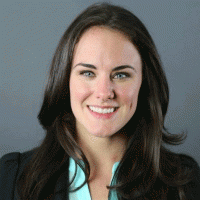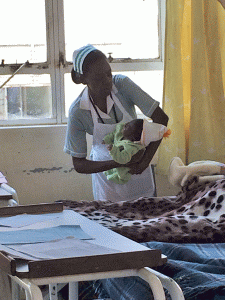Gillings School student worked to improve women’s health in Zambia
July 21, 2016
This article, compiled and written by Jamie Gnazzo, first appeared July 7 on the UNC Global website.
Jane Chaffee didn’t realize her passion for public health until she was working at her first post-college job.

Jane Chaffee, pictured here, says her women’s health project in Zambia was “the most important thing I’ve done in my entire school career.”
After graduating from UNC-Chapel Hill in 2011 with a bachelor’s degree in political science, Chaffee accepted a position at a small health-care law firm in Washington, D.C. Her work there – coupled with the global perspective she had gained from her political science studies – sparked her interest in the world of health care, and she decided to return to Chapel Hill to pursue a master’s degree at the UNC Gillings School of Global Public Health.
Chaffee now is scheduled to complete a joint Master of Business Administration and Master of Science in Public Health (in health policy and management) in 2017.
One of the projects offered through the Kenan-Flagler Business School focused upon the expansion of the women’s department at the University Teaching Hospital (UTH) in Lusaka, Zambia.
“As soon as I saw the email about that project in February 2016, I knew I had to apply,” Chaffee says. “It was the perfect combination of my interests.”

Pictured here is the maternity ward at the University Teaching Hospital in Lusaka, Zambia. Photo courtesy of Rachel Kreis.
Through Kenan-Flagler’s Global Business Projects, a program that gives students the opportunity to consult on projects for real companies around the world, Chaffee led a team of seven students tasked with developing a business plan to expand the UTH women’s department, which is affiliated with the UNC Department of Obstetrics and Gynecology’s Global Women’s Health division.
For two-and-a-half weeks in May, Chaffee and her team interviewed clinicians and nurses, observed hospital practices, and met with government officials and construction companies in Lusaka, Zambia’s capital city. The team collected data that would help determine the cost of building an entirely new women’s hospital, and what such a facility would require.
“The project gave us a chance to synthesize what we’ve learned in the classroom and apply it to the real world,” Chaffee says. “I appreciated the gravity of the situation because what we were doing had a life-or-death aspect to it. Many women in Zambia die because of a lack of resources, and we were trying to change that.”
Returning stateside, Chaffee’s team finalized a presentation that included their recommendations for the new hospital. Chaffee notes that her team’s work marked only the starting point for the women’s hospital project, which will likely extend for another three to five years.
“From a very personal point of view, this project solidified my passion for the area of health care and showed me that business can facilitate public health initiatives,” Chaffee says. “It’s the most important thing I’ve done in my entire school career.”
With a year left before she completes her graduate programs, Chaffee will spend the summer in Boston as an intern at a Japanese pharmaceutical company’s center for external innovation.
“It’s an interesting shift to go from the work we did in Zambia to thinking about in-licensing and deals with biotech firms,” she says. “It’s a completely different side of health care.”
Though still undecided about her career path, Chaffee found she enjoyed the consulting work the Global Business Project offered.
“That kind of work requires a more creative thought process and has a great potential for impact,” Chaffee says. “Especially in Zambia, the culture is much more intimate, and the way people interacted with each other was inspiring. That really humanized the business process, and it’s that human side we tend to forget in the U.S.”
Gillings School of Global Public Health contact: David Pesci, director of communications, (919) 962-2600 or dpesci@unc.edu

